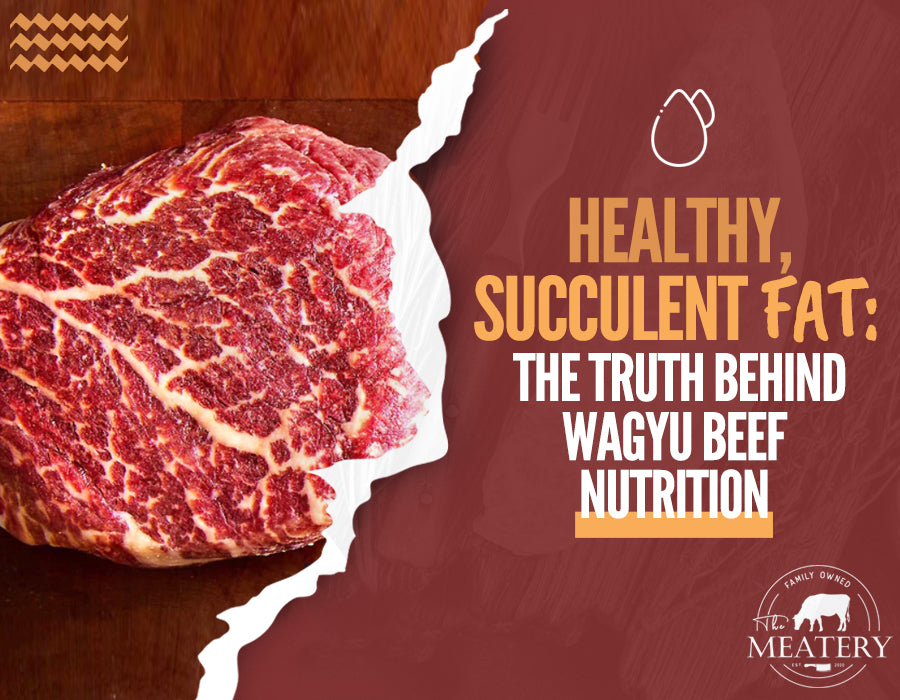Wagyu for Wellness
It is well-known that among the world of beef, Wagyu is considered a high value selection based on its marbling, tenderness, taste, and texture. Unlike other breeds of cattle, the Wagyu evenly distributes its stored fat throughout the muscle tissue rather than a consolidated grouping; hence creating a great tasting buttery texture that is easy to digest. So, Wagyu excites the palate, but what is the nutritional value to such a rich cut of beef? The answer may surprise those that have been entrenched in the “fat is bad” education of the past several decades.
For those eager to experience the full richness of Wagyu, consider trying the A5 Japanese Wagyu Ribeye, which is known for its unparalleled marbling and melt-in-your-mouth texture. Another excellent choice is the Australian Wagyu Tomahawk, a cut that combines the best of Australian Wagyu’s rich flavor and intense marbling, making it both delicious and nutritious.
Through popular shows like Alone and Naked and Afraid, survivalists and experienced bushwhackers are educating audiences on how a diet high in fat and protein are imperative when dealing with brain and muscle function when battling the elements and harsh realities of mother nature.
This entertainment also comes at a time when high-fat/low-carb nutrition, such as the ketogenic and carnivore diets, are picking up steam in the mainstream discussion, especially concerning weight loss.
In respect to nutrient density and bioavailability---how much of those nutrients your body will absorb without waste—it becomes clear that Wagyu is not just a high-end piece of meat for its flavor, but also provides much of the nutrition that our bodies require; all in one sitting!
Wagyu for Weight Loss
The uniquely interwoven fat within the muscle of Wagyu cattle makes for a great diet food if one is watching their caloric intake. Compared to a breed such as Angus, Wagyu provides a richer, fattier, umami taste that limits the amount the consumer can eat at once.
What is also important is that when fat is metabolized as the main source of energy, there is less burden on the liver to convert carbohydrates into glucose and thus, keeping one’s blood sugar levels even.
Therefore, a Wagyu steak will not spike—and thusly crash—one’s glucose levels and will keep the happy consumer satiated for a longer period than a traditional meal containing carbohydrates and sugar. This digestive satisfaction can also be attributable to the high content of B vitamins and nutrient density AND bioavailability of those nutrients for the body to absorb.
Whether you are choosing to eat once a day after a fast (OMAD), eating when hungry, or want to quickly replenish after a workout, there is no better option than a Wagyu steak.
“Complete” Protein Profile
Of course, the commonly understood benefit of beef, and therefore Wagyu, is the high protein content. Protein is a macronutrient that is broken down by the digestive system using hydrochloric acid and enzymes (proteases) to properly absorb the assorted amino acids that make up that given protein.
Out of the 20 necessary amino acids--11 of which can be created naturally by the human body (nonessential) and 9 that must be obtained exogenously through diet (essential)--your Wagyu steak will contain 18 of the common amino acids, including all 9 of those classified as essential.
On top of that, creatine, which is a branch chain amino acid (a complex of 3 amino acids) created endogenously from valine, leucine, and isoleucine; is also present in beef and contributes to muscle growth and recovery.
These nutrients are vital for the proper functioning of every system in the body, whether it be metabolic health (building muscle, liver function, insulin sensitivity, energy), hormone balance (mood, sleep, immune system, fertility), and neurotransmission (brain health, nervous system response).
Cholesterol that Contributes – Benefits skin, immune system and more
Another excellent quality of Wagyu beef, such as the A5 Japanese Wagyu New York Strip, is its cholesterol content. Studies on cholesterol continue to evolve our understanding of the benefits and potential harms of this crucial lipid. While the debate over what levels of cholesterol are considered “healthy” has led to confusion and concern, the importance of these essential lipids cannot be underestimated.
To clear the fog of fear, one must understand that cholesterol is a sterol lipid that assists in the construction all animal (therefore human) cells. Briefly stated, cholesterol is vital to the production of steroid hormones, vitamin D, and bile acid; therefore, the body must produce enough cholesterol for the health of its cells and for its systems to function properly.
With approximately 80% of human cholesterol being produced endogenously, Wagyu is a wonderful way to consume the last 20% that comes exogenously.
Now another important thing to know is that cholesterol is typically measured by lipoprotein levels found in the blood. Lipoproteins are soluble proteins that transfer lipids in the plasma; bringing fats and cholesterol to where they are needed.
These lipoproteins, however, come in different densities and ratios of apoliproteins (apo A, apo B, etc.), which are structures that bond the lipid to the lipoprotein. The concern in recent decades with cholesterol has been that higher ratios of low-density lipoprotein (LDL) to total lipoprotein found in the blood, the higher likelihood that inflammation would cause a rupture and cause the cholesterol of lower density (especially those with more apo B) to stick to the arterial walls causing plaque and eventual heart disease.
However, the good news is that Wagyu beef, like the Australian Wagyu New York Strip, contains a higher ratio of monounsaturated fats to polyunsaturated fats, along with lower saturated fat compared to other breeds of cattle. This distinctive fat profile includes higher amounts of Omega-6 and Omega-9 fatty acids, which contribute to more high-density lipoprotein particles (HDL) bonded with apolipoprotein A-I (apoA1).
The significance of this is that apoA1 is integral in creating bile acid, intestinal lipid absorption, and may lower LDL cholesterol; thus, limiting inflammation. To explain, inflammation is a sign of healing inside the body, but when it becomes chronic, can be a sign disease.
Hence, cholesterol is healing to the body and important for all the body’s systems, but if combined with high spikes in glucose and other stressors, the inflammation can become chronic and may lead to cholesterol being a blockage rather than a benefit.
Choline – Perinatal Health and Neurotransmitters
Another essential nutrient present in high quantities in Wagyu beef, such as the Australian Wagyu Tomahawk, is a little-less-talked-about compound called choline. “Essential” in this case means that one must absorb most of their choline through food because the liver is not able to organically produce enough of it to support all the vital functions for which choline is necessary.
Without getting into the minutiae, choline is imperative to supporting healthy fetal and adolescent brain development; liver function, as it is sometimes taken as a supplement to treat nonalcoholic fatty liver disease (NAFLD) and cirrhosis.
Additionally, choline is an integral part in the creation of neurotransmitters (acetylcholine) that are involved in many functions of the body including regulating heartbeat, muscle movement, and memory to name a few.
Within the cells, choline must be present to create fats that support the structural integrity of the membrane and is used, along with folate and B12 (essential nutrients also found in Wagyu), to aid in DNA synthesis.
B Vitamins – Brain function and metabolic health
Speaking of B vitamins, Wagyu has a proficient level of Thiamine (B1), Riboflavin (B2), nicotinic acid (B3), previously mentioned choline (B4), pantothenic acid (B5), pyridoxine B6), folic acid (B9), and cyanocobalamin (B12).
Since Wagyu contains all these essential B vitamins, there would be no need for the common supplementation of a vitamin B complex for which many Americans use to assist with metabolism.
Having the various B vitamins that are crucial in creating enzymes that metabolize fats, carbohydrates, glucose, and amino acids, all in one whole food such as the Australian Wagyu Filet Mignon, ensures that the body has the tools necessary to convert and transfer nutrients into energy.
Vitamin K2
This fat-soluble vitamin is found in higher quantities in organ meat, but also in moderate, and more bioavailable levels in red meat such as Wagyu. Unlike vitamin K1 found in plants, vitamin K2 is absorbed easier and has more functions for the human body.
For one, it is necessary for the binding of calcium (for which Wagyu has 20mg/100g) to bones to maintain density and prevent osteoporosis. Due to this binding of calcium, K2 is now studied and believed to remove calcified plaque from arterial walls, thus making it a great weapon against coronary heart disease.
A Multitude of Essential Minerals
Minerals can be hard to come by, especially in a bioavailable form. A Wagyu steak, such as the Australian Wagyu Ribeye, provides plenty of essential minerals that the human body needs.
These include the following: calcium for bones and teeth, phosphorus for repairing tissue and strengthening bones while also helping to remove waste; copper for iron absorption, which along with iron helps create red blood cells and prevent anemia; selenium to fight off infections, and zinc for hormonal health and to help create white blood cells.
Discover the Ultimate Nutritional Excellence with The Meatery's Wagyu Selection
Given the nutritional density of Wagyu, one can conclude that it is among the best whole foods a human can consume. Cattle are amazing creatures that process what is given to them on the earth and transform it into essential accessible nutrients to transfer to humans.
All essential vitamins, minerals, amino acids from its complete protein profile, and essential cholesterol from its complete fat profile are present for the brain and body to thrive through a busy day. Whether its Japanese, Australian, or American Wagyu, you can be sure that the Meatery sources its beef from ranches that properly raise their cattle and in turn, will provide a flavorful, nutritious product that will nourish you and your family.









